Breaking Bad cast give oral history of classic show

Television changed the night of January 20, 2008: Breaking Bad, a bold and singular drama about a downtrodden, dying high school teacher so desperate for cash that he starts cooking crystal meth, would come to define a golden era of television.
But nobody knew that on the night the show premiered. In fact, there was every reason to assume the show, debuting on a then-nascent network with no track record in original programming, wouldn't last past its first season.
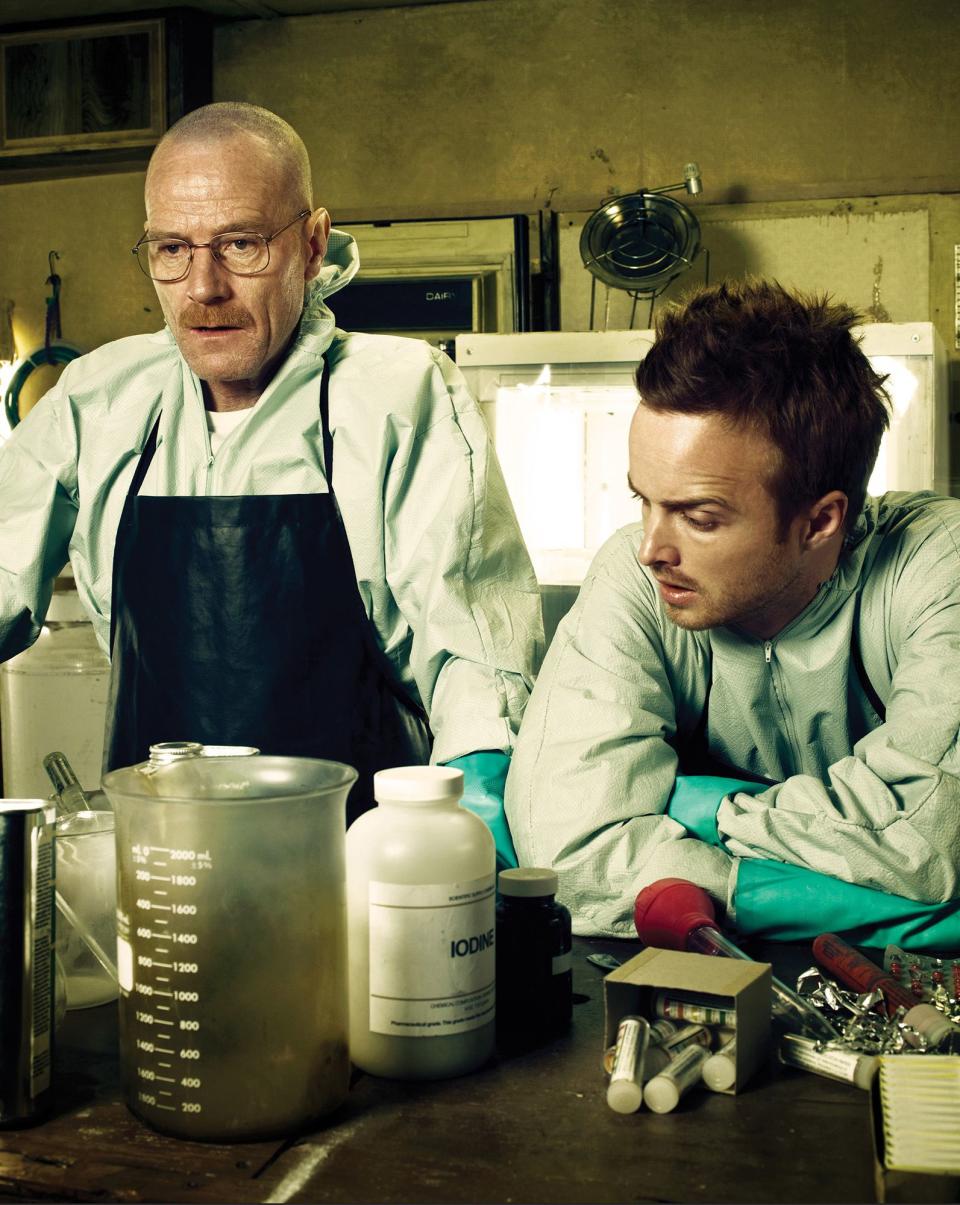
Breaking Bad was not a ratings hit, not a household name, not a show that earned a spot in the zeitgeist for several years. Its slow-burn character writing, bleakly stunning visuals, and moral nuance made it niche; its early days brought a series of hurdles that could have killed a lesser show.
But it had a passionate fanbase, a growing mass of critical support, and a network that believed in this story of a good man gone bad - or, depending on your take, a bad man finally given the chance to unmask himself.
Turning "Mr Chips into Scarface," as creator Vince Gilligan has famously dubbed Walter White's transformation from milquetoast to ruthless drug lord, is no small feat. Through Bryan Cranston's six-time Emmy-winning performance, viewers witnessed a modern-day Greek tragedy - a man who claims to be protecting his family but ends up destroying them, along with Jesse (Aaron Paul), his protégé and greatest victim.
It was a meticulous, mesmerising character study that made it impossible to look away once you were in. As the acclaim and the awards piled up, the ratings gradually followed. By the season finale in 2013, viewership had spiked tenfold, with a record 10.3 million viewers tuning in for the final chapter.
To mark the 10-year anniversary of the premiere, Esquire spoke with Breaking Bad's creators, actors and broadcasters to reflect on this little-show-that-could, its groundbreaking approach to antihero storytelling, and its ascent from hidden gem to cultural phenomenon.
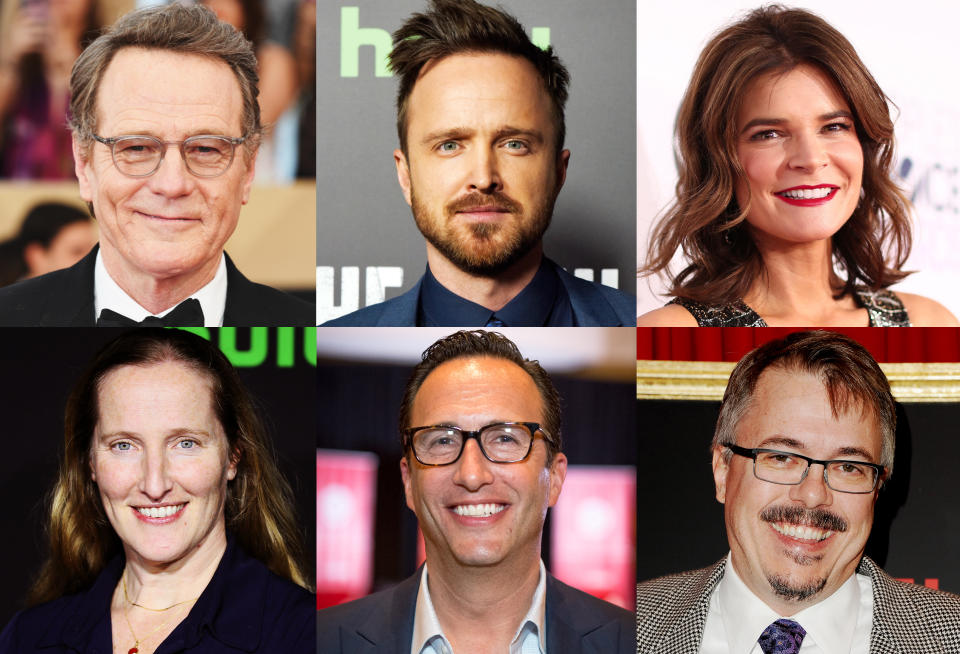
(Clockwise from top left: Bryan Cranston, Aaron Paul, Betsy Brandt, Vince Gilligan, Charlie Collier, Melissa Bernstein.)
2006 - 2007: THE ORIGINS
Vince Gilligan, Creator and Executive Producer: Breaking Bad didn't get a "no" from everybody in town, only because we were smart enough not to pitch to everybody in town. I figured this was not going to be everybody's cup of tea, so it really wasn't surprising that the show got turned down a lot.
Bryan Cranston, Walter White: I knew Vince Gilligan was attempting to do something that has never been done on television before-to change a character completely from beginning to end. Television had always been about stasis, characters that you could rely on, that you know very well, and that are comforting in a major way, and he was attempting to upset the apple cart.
Charlie Collier, President of AMC, SundanceTV, and AMC Studios: I remember the day Breaking Bad hit my desk, because it was like nothing else I'd seen. At the time, we [AMC] had committed to Mad Men as our first scripted original series, but had not yet aired it. Having greenlit that, we were getting every historical pitch-flappers, Motown-and we wanted to steer clear. Having been American Movie Classics, we didn't now want to become an "original classics" network known for period shows.
Vince Gilligan: Breaking Bad was dead by the time AMC came into the picture. I was emotionally moving onto other things, thinking, Well, we fought the good fight, but this show was just too damn crazy. A show about a guy cooking crystal meth and he's the hero? What did I expect? When I got a call from my agent saying, "Hey, the folks at AMC want to meet with you about your project," I said, "Which project?" That's how far gone I was. My response was "AMC? The channel where they play Short Circuit 2 ten times a day?" Little did I know they were undergoing a renaissance at that point.
Charlie Collier: I knew it was a distinctive and somewhat crazy bet. A teacher cooking crystal meth, on an ad-supported network… I credit my bosses for their vision, because these are not easy bets, and they're not small bets. But betting on Vince Gilligan was one of the most wonderful and rewarding decisions of my career.
Vince Gilligan: I'd heard through the grapevine that AMC were doing a show about the advertising business in New York in the early '60s. I thought... and they also want this? The folks running AMC must be either really really visionary, or really really crazy. I didn't know which, and I didn't much care at that point. I was so happy to talk to someone who was into my project.
Bryan Cranston: You think about the first page of that pilot script. Open skies. Vast plains. A pair of trousers are falling down and hit the ground, and they're run over by an RV. Inside it, the driver is wearing nothing but underwear and a respirator, another man is passed out in the passenger seat, two bodies in the back are sliding around in a sea of chemicals and glass-that's page one! It certainly captures your attention.
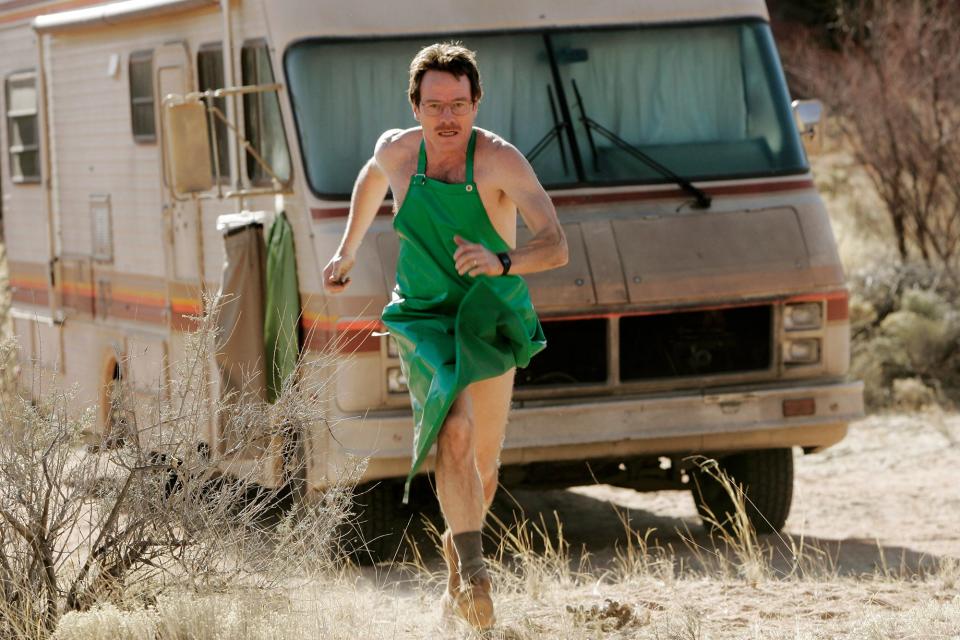
Aaron Paul, Jesse Pinkman: It was easily the best hour of television that I'd ever read. I knew I had to fight for it, but I also thought, How the hell is AMC going to pick this up to series? I really thought it was going to be a stretch.
Betsy Brandt, Marie Schrader: When you sign up to do a show about a high school teacher who ends up cooking meth, you're not gonna run out and buy a new house. It may not be on forever! It was a risk. But when I first read it, I said to my husband, "This is the best pilot I've ever read. I don't really know what this is, or where it fits in, but I don't really care. This is my show, and I will do any role they ask me to do."
Bryan Cranston: I asked my agents to move up the interview, which was originally scheduled for a week's time. I knew once actors started reading this, they were going to be all over it, and I wanted to get in there early and try to convince Vince that I was the guy. My twenty-minute scheduled meeting with Vince turned into an hour and a half, and that conversation gave me the impetus to start imagining what Walter White would be: How he would be a little overweight at the start, his hair needs a cut, his clothes are the same color as the walls. He was just an invisible man, to himself and to society. That conversation with Vince was the only audition I had, and after it he became my champion to get the role.
Vince Gilligan: After working with John Toll on the pilot-the man who's won two cinematography Oscars back to back-I knew that Breaking Bad could never be a complete success unless it looked not just like a movie, but a great movie. It had to be cinematic with every frame. I wanted it to look like The Godfather, I wanted it to look like a John Ford western. We were really shooting for the stars.
Charlie Collier: On premiere night, we did all the planning in the world to launch the show. We scheduled the pilot for the night of the NFC championship game, which was typically the highest non-Super Bowl event in sports. We thought the show would be male-skewing, so there's forty to fifty million men who will be coming off this event, and this is what we would launch Breaking Bad into. Lo and behold, the Giants played the Packers, and the game went into overtime. Only one championship game in the history of the NFL had ever gone into overtime before, and this one did! So for the first fifteen minutes of the premiere, most of America was still watching the game. Looking back, there were countless moments like that where Breaking Bad shouldn't have succeeded, but the material was strong enough to overcome it.
2007 - 2008: HIGHS & LOWS
On November 5, 2007, the Writers Guild of America began a strike that would last four months, halting production on more than 60 shows. Breaking Bad, which was still in production when the strike was confirmed, had its nine-episode order cut down to seven. The following summer, the show was unexpectedly nominated for four Emmy Awards and won two-including the coveted Best Actor in a Drama award for Cranston.
Melissa Bernstein, Co-Executive Producer: The strike was an incredibly stressful time. Because we were not an established show, we had a relatively short order and we were on a new network, our existence felt very fragile.
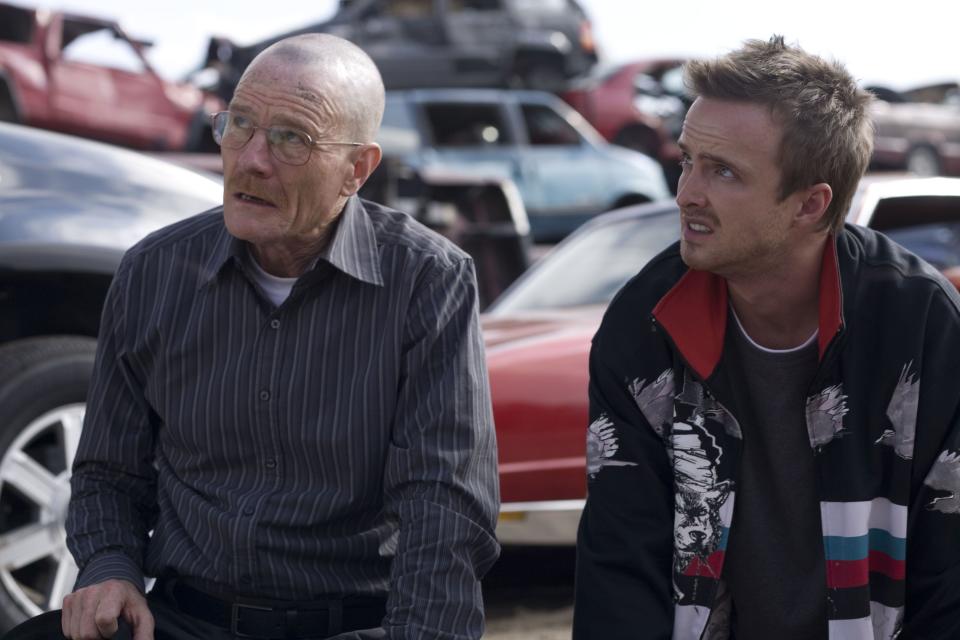
Aaron Paul: I was panicking. Before this show, I was at the lowest point in my career. I'd been working pretty steadily and I'd have dry spells, I'd get a random commercial that would help me pay rent for a few months. When Breaking Bad came to me, I'd kind of run out of money. So to then see the strike coming, it was like, Oh god, what am I gonna do? It was a crazy time.
Vince Gilligan: Before the strike, being the freshly minted showrunner that I was, I was ready to throw the kitchen sink at the finale. We were shooting these episodes completely in a vacuum, and so out of some blend of showmanship and fear and desperation, I figured the finale ought to just be so slam-bang that people would want to come back for Season Two.
Aaron Paul: I remember reading one of the late Season One episodes that never got made, and there was a lot of stuff in that particular episode that I'm so happy didn't happen yet. There was a specific death that happened in that episode where I jumped out of my seat, like, No! No way! We saved some of those beats for later on.
Vince Gilligan: I was going to kill off the character of Hank at the end of that first season, having originally planned to kill Jesse and changed my tune on that pretty quickly because I realized how great Aaron Paul was. Of course, Dean Norris was just as great, but I figured I ought to sacrifice one of the main characters at the end of Season One, because that's what the ballsy shows do! But the whole shape of the show would have been so different from what you know now, and I think it would have been a much shorter, less rich experience.
Charlie Collier: The strike changed everything. It cut the season short by two episodes, and fortunately Vince and his team were nimble enough to be able to deliver their first seven episodes and have it make sense, and not leave you feeling like you got half a season.
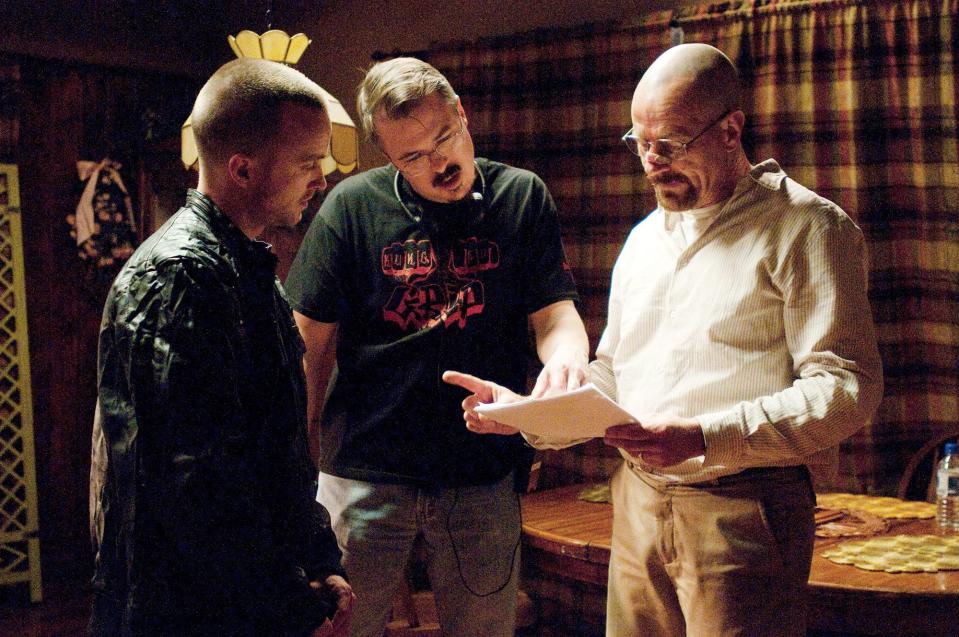
Vince Gilligan: It was a terrible time for so many people, the strike, but for me it was a godsend. I had never run a show before, and by the tail end of our first season, I was spending time in the wrong place. I should have been in the writers room [in Los Angeles], and instead I was 800 miles away on the set in New Mexico, picking wardrobe, location scouting, talking to directors. These things are important to showrunning, but not as important as getting the scripts dialed in. As a result, it suddenly dawned on me that within a day or two, we were going to need a new script and we didn't have one, because I had this wonderful team of writers back in L.A. trying to break the last episodes without me. At just about the time we would have had to shut down for lack of scripts, which in those early days might well have been a death knell for the series, the WGA went on strike, thus saving my ass, for which I will be forever grateful.
Melissa Bernstein: Ultimately, it was a real blessing for us. We were running out of scripts, and I think Vince had gotten a little ahead of himself in terms of the pace of the story. We were burning through more story than we should have, and the strike allowed us to slow down and rethink where Walt was going to get to by the end of the first season.
Vince Gilligan: The first moment it dawned on me that we might really have something here was when Bryan got nominated for an Emmy on the basis of those first seven episodes. My phone rang at 6:30 in the morning-I'm not even sure I knew the Emmy nominations were coming out that day, that's how low my expectations were-and instead of picking up, I listened to the answering machine, and it was my producer Melissa Bernstein. And I can tell she's crying. I'd never heard her cry in my life, and she's choked up with emotion, saying Bryan got the Emmy nomination, and the show got three other nominations. It just blew my mind.
Melissa Bernstein: We were floored by those four nominations. We just did not think we had registered in that way, and we felt like such underdogs. We loved the show so much, and we were such a passionate and connected family, and sometimes it felt like that was going to have to be enough. Getting this recognition seemed like too much to hope for.
Bryan Cranston: I didn't write a speech, because of course I wasn't going to win. We'd only had seven episodes! My wife was getting a little nervous as they announced my category, and I said, "Robin, relax. We're not going to win." And then I hear my name. It was shocking. I didn't think about the grand scheme of things at the time, but in retrospect it was a sign. We had struck a nerve with the TV Academy, and it just started to mushroom after that.
Vince Gilligan: I'll never forget that moment they read out Bryan's name. I launched out of my seat like some drunken sports fan, and screamed "FUCK YEAH!" so loud I actually hurt my vocal chords, and I was slamming my hands together. It wasn't even clapping, just beating them together. I'd never clapped so hard in my life, it was almost scary. Bryan is the whole package; he's such a fine actor that even if he were the world's biggest asshole, he'd be worth working with. But he's also the greatest guy, and so beloved by his peers. So in hindsight, I think, of course he won! But at the time, it was a shock.
Betsy Brandt: I always jokingly say that in Season One, we'd be sitting in a tent outside in the New Mexico weather, with just one potato for the six actors to share between us. And then Bryan won the Emmy, and we got a temperature-controlled dining trailer! He really put us on the map. I like to think we would have continued even if he hadn't won that first season, but it didn't hurt.
2009 - 2011: GATHERING STEAM
Though ratings remain low, each season sees a slight increase, with Season Four debuting to an all-time high of 2.58 million viewers. Coverage at the time noted that the show was bucking the usual downward trend; most serialized dramas see their audience shrink over time, while Breaking Bad's kept growing. The show continues to garner awards-Bryan Cranston wins two more consecutive Best Actor trophies, along with Aaron Paul for Season Three-and tops critics lists. In 2011, the first three seasons were added to Netflix, prompting a new collection of viewers to catch up.
Vince Gilligan: The show had a "little engine that could" quality for the first two or three seasons, because it really struggled in the ratings. Still to this day, it amazes me that it suddenly caught fire in the way that it did, because it could so easily not have lasted. The advent of streaming video, typified by Netflix, really saved our bacon.
Aaron Paul: Breaking Bad was one of the first series people binge-watched, because the first three seasons all plopped onto Netflix at once. AMC made their deal with Netflix when we were still shooting Season Four, I believe, and that's really when the wave started.

Charlie Collier: Each year it grew. It needed time to grow, and it needed patience from our organization, and what was great was watching our marathon ratings grow, and watch the buzz grow between seasons. Season Two came back a little higher, and then Season Three, and by the time we announced that it was ending after Season Five, it had become so many people's obsession that there was a real urgency to it, so it started to crescendo.
Bryan Cranston: I realized it was really becoming something in our third season. Every TV or film production has these directional signs that tell the cast and crew where to park for that day's location, with arrows, and in the first season they said "Breaking Bad." Those were stolen, so in Season Two, they said "BrBa," and those were stolen. So in our third season, the producers and location managers had to use a fake title-I think they put up a fake sign like for a mayonnaise commercial or something. When I realized people cared enough to steal these things, that was a formative moment.
Vince Gilligan: I never really felt like we were out of the woods, in terms of cancellation. Sony and AMC, our studio and broadcaster, were wonderful partners, but I didn't really realize how much until it occurred to me, at a later date, just how tough it was for them to make any money on this thing. I don't really remember what the numbers were, I was too scared to ask. [Note: Seasons Two, Three, and Four averaged 1.30, 1.52 and 1.90 million viewers, respectively.] I was too scared to ask, but I just knew they were for shit in the early days. So I never really felt at ease in terms of assuming we would get picked up. Every year we had to wait to find out, sometimes we had to wait until well after the show had finished airing for the season, and that was rough. You're on tenterhooks.
Betsy Brandt: When they give Vince a budget constraint, he really made the best out of it. There were moments of, Thank God they didn't give us the money to do A, because B ended up being so fantastic. For instance, you look at that show and you can't imagine it being set anywhere but in Albuquerque, but that was not the original plan.
Melissa Bernstein: The show was originally written for California, but New Mexico got brought up because of the tax rebate. It was for economic reasons, and I think a lot of showrunners would have fought that, but Vince got on board with it very quickly. He liked the aesthetic of it, he liked the specificity of it, he loves westerns, and the setting felt right for a regular lower-middle-class family trying to make ends meet.
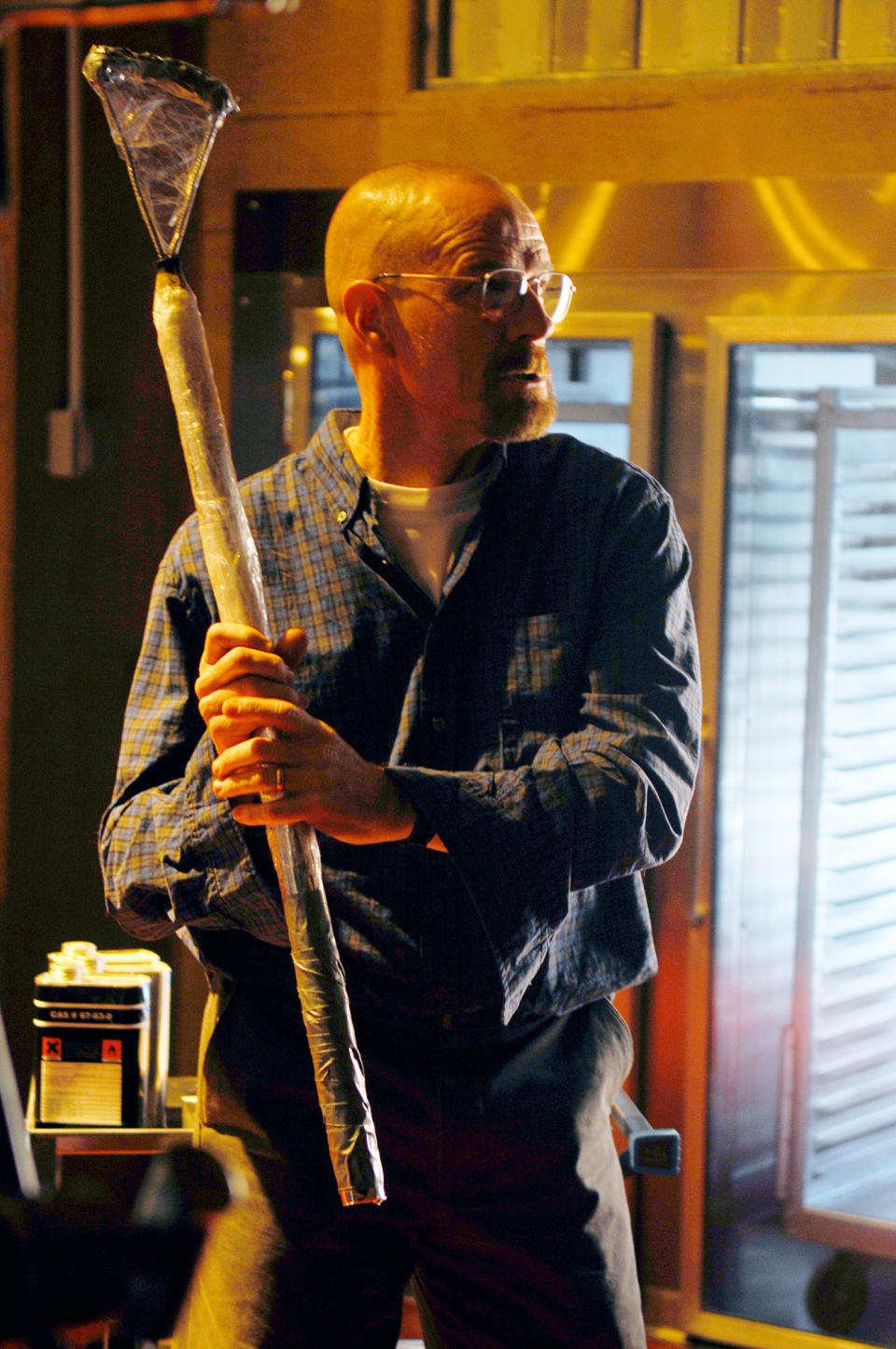
Vince Gilligan: Necessity is the mother of invention. Take "Fly" in Season Three; that episode sprung strictly from the fact that we were out of money for the season. We were under a lot of pressure from Sony, the keepers of the budget, and in that particular season we were millions of dollars over budget, to the point where we had to do something. A bottle episode is a time-honored television trick; when you're way over budget, you shoot an entire episode in one setting, and we had this incredible set in the Super Lab. What came of that economic situation was a very divisive and polarizing episode, and one of my favorites. We always felt like it was a little bit like Waiting for Godot or something-very much a two-hander stage play of an episode-and we had Rian Johnson directing, who really made it pop visually. People who say that episode is about nothing are not watching it closely enough. It's not about Walt trying to swat a fly. It's about a character having a guilt-induced meltdown which is presenting itself as this kind of OCD episode.
Bryan Cranston: Breaking Bad doesn't engage you passively. It's not a show where you can go cook dinner or mix a drink while it's on. You have to be attentive, because your loyalties to these characters are constantly being tested, and that's where allegiances start to form. People were initially in my camp, because Walter White was initially a sympathetic character, which is part of the planned manipulation from Vince-in his masterful demonic way-to take the audiences down this road as Walt's acts become more egregious and despicable. Some people went with me all the way to the end, they were on board with Walt, and a lot of other people got off the train and assigned their allegiance to someone else-especially to Jesse-because they can't root for Walt any more. It was a show where we were constantly testing the audience to see how far they'll go.
Melissa Bernstein: I could not believe how long people stuck with Walt! There were moments each season that really demanded people to rethink their connection to that character as he was doing horribly immoral things, and hurting people, and ultimately killing people. People wouldn't let go, and found every possible reason to justify his decisions. As much as he loved Walt-and, I think, identified with him to a point-Vince felt like the character had gone over a cliff! He wasn't holding on!
Aaron Paul: So many people just hated Jesse at the beginning of the show, and then that started to change. But there were people that just never forgave him for ratting on Mr. White in the final season, even though Walt was such a psychopath by that point.
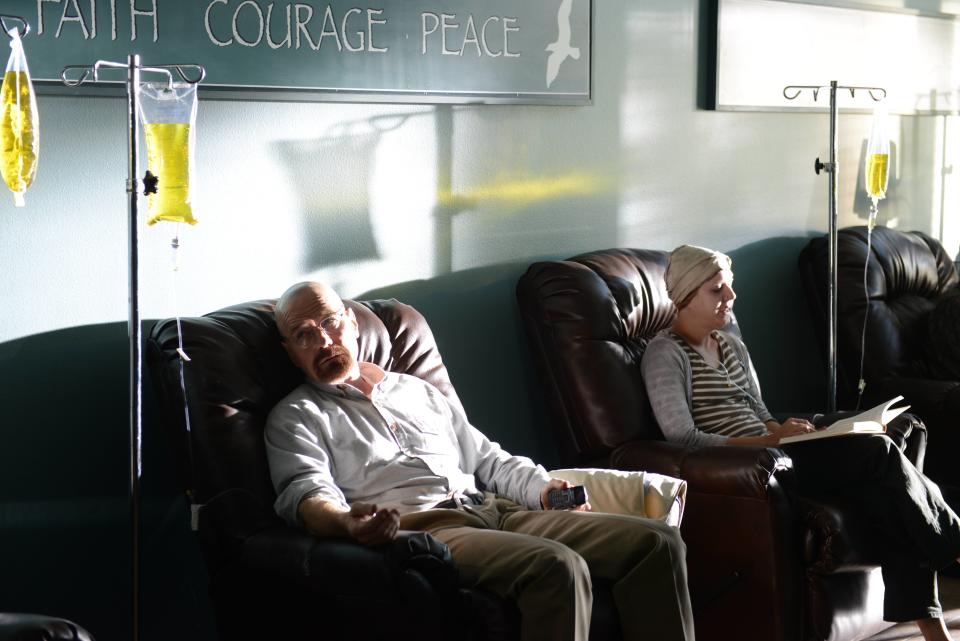
Bryan Cranston: I had people tell me, "Oh, Skyler, I hate that character!" I found that fascinating, so I would ask, why? "Oh, she's getting in the way! She's questioning you! She's preventing you from doing your thing!" So, she's preventing me from creating this disastrous, evil drug that fuels addiction and brings down local society? And you're mad at her for that? And because she wants the truth from her husband and she's concerned about protecting her children? And all of a sudden they go, "Oh, shit. Yeah." It was fascinating how the show worked on people.
2012 - 2013: THE CRESCENDO
Season Five debuts to 5.92 million viewers, doubling its audience from the previous year. That audience would almost double again by the series finale fifteen months later, which pulled in a historic 10.3 million viewers for AMC.
Vince Gilligan: Once we really got going, the whole thing was a blur to me. Honest to god, I suddenly looked up and it was six years later and I'm being interviewed on TV about Breaking Bad. I'm like, Holy crap, when did this happen? We really did keep our heads down and work, and tried not to pay too much attention to what was going on, because I didn't have any bandwidth to spare. We were just trying to make this thing as good as we could make it.
Melissa Bernstein: Vince is actually a masterful marketing mind, and at every turn he had great ideas about how to make the show indelible, how to make it stand out, how to make it really specific in the marketplace. The "BrBa," where you could just see those two green checkerboard squares and know the show, he was after that kind of graphic connection. We were putting so much energy into these little campaigns, these guerrilla tactics, that it was a shock at some point to realize, Oh my god, people are actually watching the show! We had been in a very grassroots place, thinking, How do we get five more people to watch? And the show finally just took on a momentum of its own around Season Four.
Aaron Paul: We lived and breathed these characters. In the final season, some of the stuff that was happening to Jesse hit me in such a personal way. Watching Andrea die in the second-to-last episode was possibly the hardest thing that I had to do in that entire show, because there's no dialogue-it was just me tied up and gagged and screaming.
Betsy Brandt: That scene with Marie and Skyler-where I slap her, and when we're fighting over the baby-I'm sure it shaved years off of my life and Anna's. And the awkward table side guacamole scene... I was having chest pains, it was so stressful. I remember asking Michael Slovis, who directed it, "Did we get it?" Once we did, I hugged Cranston and just cried, and I said, "It's so hard to look you in the eye and tell you to kill yourself, and mean it." I know that it's not Bryan I'm saying that to, but it was just wonderfully heavy stuff. These characters were all so real and so alive to us.
Bryan Cranston: I had specific ways to get out of character at the end of a day. I would wrap a moist towel around my bald head, and another one around my face, and sit there in the makeup and hair trailer and just allow the day's grime and negative energy to escape. I'd wipe it all off of me, and that helped relieve the burden of carrying around this man's darkness. Another thing I did every night was call my wife in California and just talk. She didn't live through 14-hour days of Walter White. She'd talk about what's going on at home, which helped me get out of that frame of mind and back into Bryan.

Melissa Bernstein: When we got the third-to-last script, "Oyzmandias," I had to take breaks between reading it, because it was so intense. And that is not my personality: I just barrel through. But I really had to step aside and just absorb it, because my mind was racing. That was a very intense, visceral experience that I will not forget.
Betsy Brandt: There are a few scenes I still haven't watched: when Hank gets shot in Season Three, and his death in Season Five. I remember when we all got that script [for "Ozymandias"]; the actors were all emailing each other, and I hadn't read it. I think I was the last one to read it, and I said, "If I don't read it, does that mean it won't happen?" Like a child. It just broke my heart. I know Dean's gonna be fine, but it broke my heart that Hank wasn't going to be in that world, because, God, we really needed him. I could cry right now just thinking about Marie having to carry on without him.
Vince Gilligan: I don't think the writers and I ever suffered so much in our lives as with the finale. Trying to make it make as much sense-be as appropriate, be as fitting-as it needed to be. It was a load off when we suddenly realized one day: It doesn't have to end happily. This seems obvious in hindsight, but we realized all we needed to do was write the ending that satisfies, even if it's unhappy.
Bryan Cranston: By the end, a lot of people's allegiance had switched to Jesse. And Jesse was an innocent, in many ways. Yes, he was a drug dealer and a drug user, but I think at a certain point the audience realized, Oh, he needs to escape from Walter. Walt became his own kind of cancer, a carcinogen in his own right, by virtue of the way he affected everyone around him. So, by the end, people wanted to save Jesse. And rightfully so.
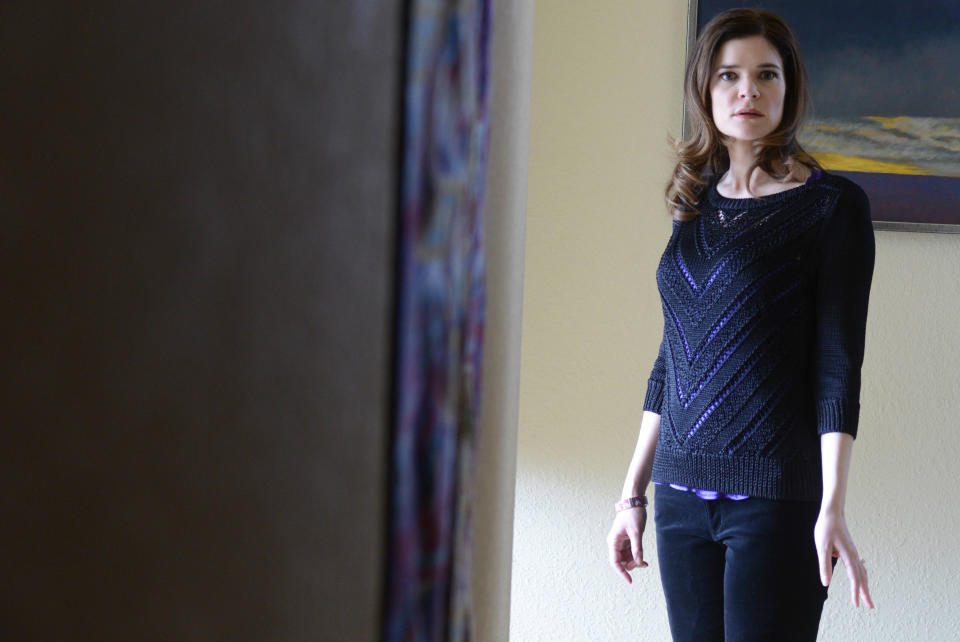
Betsy Brandt: I was such a fan of Six Feet Under and its series finale; toward the end I would ask the writers if we could do that. I was like, "Just write it! We don't have to shoot it, I just want to know everybody's endings!" But the finale was just the perfect ending.
Bryan Cranston: There was tremendous pressure on Vince with the finale because of what had been built up, and he came through with the perfect expression of this world. We all watched it live at the Hollywood Forever cemetery; 3,500 people watching on a big screen, and you could hear a pin drop. Nobody was talking, nobody was rustling, everybody was just invested so heavily. It was extraordinary.
Vince Gilligan: We were known throughout our run as a show with a lot of twists and turns and surprises in terms of plot, and it was a great load off our minds to realize the finale didn't need to be necessarily surprising. Sometimes the best surprise is no surprise.
Aaron Paul: I was out for dinner last night, and someone just came right up to me screaming, "Science, bitch!" I get called "bitch" every single day. I have been called "bitch" more than anyone on the planet, and that is very exciting. I'm very proud of that fact.
Vince Gilligan: It still blows my mind that it turned into a worldwide phenomenon. I'm still waiting for someone to pinch me and tell me, "No, that never really happened."
Betsy Brandt: I understand the concept of "lightning in a bottle," but it doesn't really make sense as you're experiencing it. It wasn't until later that I realized that's what it was.
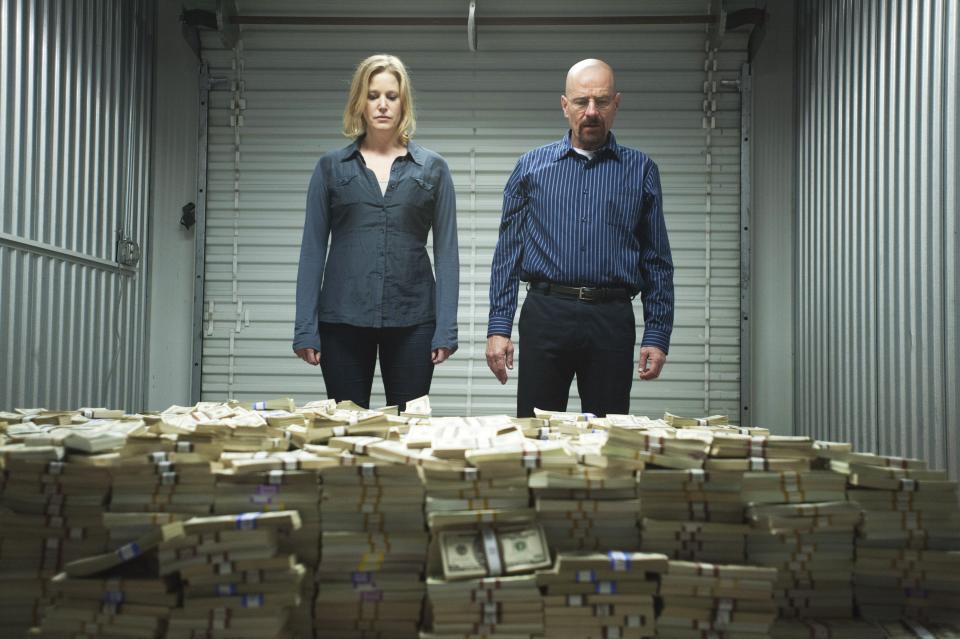
Aaron Paul: I went to the premiere of Better Call Saul, and I remember kind of sneaking around the red carpet, not wanting to be noticed because obviously this was about the new show. I remember being surrounded by my Breaking Bad family, but feeling a little bit disconnected and a little sad that I was not moving on with them, to be a part of this. It was a little strange, to have this new cast of characters; they were all so sweet and kind, and I was so excited for them. That show has just taken on a form of its own, and that's what I think was so smart. I was always saying, "It's just downhill for me from here," because Breaking Bad was such a phenomenon. Anything else being multiple steps lower doesn't mean it's bad, it's just not as good. I was totally OK with that.
Bryan Cranston: People ask me today, "Do you miss it?" And of course: I miss the experience, I miss the people. But I don't miss playing Walter White, and the reason I don't is that I finished the book. Vince was given permission to completely go through a beginning, middle, and end. We came to such a rewarding ending that it would be like reopening something. I'd rather go out like a proud athlete, ahead of our time, as opposed to coming back and trying to make something more of it. Let it be what it is. Leave it alone and be proud of it, and enjoy the fact that we had this moment.
Want up-to-the-minute entertainment news and features? Just hit 'Like' on our Digital Spy Facebook page and 'Follow' on our @digitalspy Twitter account and you're all set.
You Might Also Like

 Yahoo News
Yahoo News 
